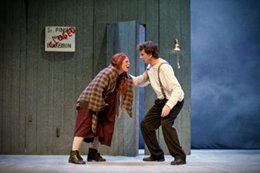Mephisto Theatre Company’s first sortie onto the boards of the main stage at Galway’s Town Hall Theatre is an epic step in the company’s five year theatrical voyage. Aided by a production team of sixteen, a cast of thirteen performers sing, dance and fight on a set that stretches to the bulwarks of this theatre; all to tell a tale of near Odyssean proportions. Whilst its scale causes the occasional wobble, it is an ambitious embarkation for a company which receives no public arts funding.
.jpg.aspx%3Fwidth=260&height=173) Breda Claffey, the main character in Bryan MacMahon’s The Honey Spike searches for her Ithaca in Kerry rather than the Ionian Sea but her struggle is nearly as fraught and almost as bloody. Although she and her husband, Martin, are proud of their recent vast journey from the deep south to the far north of Ireland, the heavily pregnant Breda is determined that she give birth only in her lucky ‘spike’ (hospital) back in Dunkerron, Kerry. Three hundred miles must be travelled in five days. IRA fugitives, British soldiers, errant priests, a Bacchanalian brawl and love tussle at Killorglin’s Puck Fair test our adventurer. At the same time, Breda’s culturally specific superstitions, traditions, myths and expectations mould, obfuscate and confound her luck.
Breda Claffey, the main character in Bryan MacMahon’s The Honey Spike searches for her Ithaca in Kerry rather than the Ionian Sea but her struggle is nearly as fraught and almost as bloody. Although she and her husband, Martin, are proud of their recent vast journey from the deep south to the far north of Ireland, the heavily pregnant Breda is determined that she give birth only in her lucky ‘spike’ (hospital) back in Dunkerron, Kerry. Three hundred miles must be travelled in five days. IRA fugitives, British soldiers, errant priests, a Bacchanalian brawl and love tussle at Killorglin’s Puck Fair test our adventurer. At the same time, Breda’s culturally specific superstitions, traditions, myths and expectations mould, obfuscate and confound her luck.
MacMahon creates a detailed and affectionate portrait of the mid-twentieth century Traveller and he would appear to have considerable insight to the vicissitudes of the life and social history of this community. With careful reproduction of a musical language (a rugged Synge/JB Keane twang) he details lives dominated by often restrictive social practices both within and outside the group, and the play is an intimate documentary of one woman’s struggle to survive within this set of rather archaic rules. Perhaps Mephisto’s decision to produce what feels to be a dated and occasionally sentimental portrait of country living is based on their viewing the play as a microcosm of life in the wider community: existence is difficult when so much seems stacked against it and it doesn’t matter who you are. Certainly Brendan Savage’s set, with its large, formal geometric platforms amongst naturalistic props and flats, seems to invite a more symbolic interpretation of the work.
MacMahon certainly does not shy away from portraying aspects of a society’s propensities (alcohol, prejudice, violence and irrational superstition) that inhibit freedom and eventually contribute to Breda’s death, but director Caroline Lynch and the company seem to focus on emphasising a rather romantic view of this travelling life. It all  feels a little mawkish, almost twee, despite the fact that the play obviously hearkens back to a time when this community had a more defined and respected place within Irish society: songs, poems, music, and deft manual skills identify a resilient and resourceful people, in tune with a very rural world around them.
feels a little mawkish, almost twee, despite the fact that the play obviously hearkens back to a time when this community had a more defined and respected place within Irish society: songs, poems, music, and deft manual skills identify a resilient and resourceful people, in tune with a very rural world around them.
This is a generally engaging production, which is distinguished by energy, hard work and an often interesting use of space (actors surrounding the audience with song at the opening, for example), but this large-scale endeavour sometimes strains the company’s resources. Lengthy set changes contribute to a running time of well over three hours, the Puck Fair felt a little underpopulated (despite ingenious off-stage rumpuses), and the final set was awkwardly positioned. Even the Town Hall Theatre itself contributes problems: all the actors produce committed and truthful portraits, particularly in Emma O’Grady’s sympathetic and passionate portrayal of Breda, and the popular Helen Gregg’s impeccably judged cameo as Poll-Poll, but there are often very frustrating issues with limited voice production throughout.
Galway has an enviable history of theatrical exploration, and Mephisto are one of the companies pushing the boat out. Whilst their move from an intimate studio to the open reaches of a large theatre is an obviously difficult trip, that courage of convictions is to be admired.
Matthew Harrison